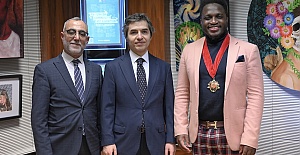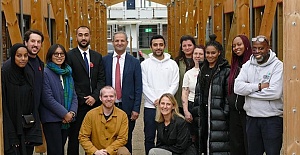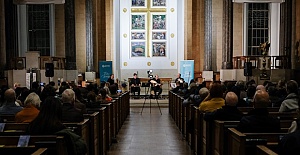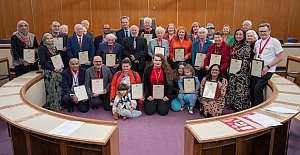The 36 Boys were the largest gang of Turkish youth from Berlin, Kreuzberg. Al Jezeera recently has told the story of Turkish immigrants in Berlin through a documentary about 36 Boys[1]. This interesting documentary shows the struggle of Turkish immigrants living in Berlin through the lives of a Berlin street gang. It focuses on the influence of increased racism in the 1980s and 1990s on the lives of Turkish immigrants in Germany and includes such interesting quotations from the members of 36 Boys and Turkish immigrants living in Berlin, Kruezberg.
Turkish youth were fighting against racism at the same time they were protecting their neighbourhood as one of the founders of 36 Boys said that “Kreuzberg was our neighbourhood”[2]. Another member of 36 boys stated that “I was born and raised here. This is my country. My mother and father helped built it.”[3] Germany, Berlin and more specifically Kruezberg play a crucial role in their identification. In the case of these young people, the definition of ‘home’ is related to where they built their social lives. Being born in Germany makes it home; being raised in Germany makes it home. Socialising and building a life in Berlin- Kreuzberg- make it easier to familiarise with the city and the local neighbourhood as well as plays a crucial role in defining ‘home’. Belonging is challenged. It is not based on young people’s national entitlement; it is associated with the everyday experiences of young people and the meaning they give to these places and their social world. Therefore, belonging is connected to an urban space rather than a nation and/or ethnic communities.
However, their relationship with Turkish identity has strengthened as a result of the negative perceptions on Turkish immigrants in Germany. They were the children of immigrants and during 1980s and 1990s they faced discrimination and racism. Turkish immigrants were not welcomed in Germany. As one of the members of 36 boys stated that “My first memory of Germany is the graffiti on the walls. It reads: Turks out.”[4] Their relationship with the country of settlement signifies resistance and struggle. They refused to assimilate; they refused to change. They were fighting against neo- Nazis, racism and discrimination. In order to protect themselves, their families and their neighbourhood Kreuzberg, they formed gangs.
The story of 36 boys reveals the struggles of Turkish immigrants living in Germany; represents a good example of resistance. More specifically, it shows that ‘home’ signifies human relations beyond national boundaries.


 After Nesil Caliskan a by-election will be held in Jubilee ward in Enfield
After Nesil Caliskan a by-election will be held in Jubilee ward in Enfield Publishing the analysis, Labour’s Cllr Ergin Erbil said Everybody in Enfield deserves basic rights
Publishing the analysis, Labour’s Cllr Ergin Erbil said Everybody in Enfield deserves basic rights Gaza-Israel conflict Statement from Cllr Ergin Erbil, Leader of Enfield Council
Gaza-Israel conflict Statement from Cllr Ergin Erbil, Leader of Enfield Council Cllr Ergin Erbil was elected as the new Leader of Enfield Council
Cllr Ergin Erbil was elected as the new Leader of Enfield Council The European Union called on Turkey to uphold democratic values
The European Union called on Turkey to uphold democratic values Turkish citizens in London said Rights, Law, Justice
Turkish citizens in London said Rights, Law, Justice The Council of Turkish Cypriot Associations Geneva response letter
The Council of Turkish Cypriot Associations Geneva response letter Sustainable Development and ESG, Will This Become the Course for Turkic World
Sustainable Development and ESG, Will This Become the Course for Turkic World The 'Prince of Paris' has impressed in his first EuroLeague season
The 'Prince of Paris' has impressed in his first EuroLeague season Saran Media And Euroleague Basketball Extend Media Rights Partnership for Four More Years
Saran Media And Euroleague Basketball Extend Media Rights Partnership for Four More Years Will Rangers be Jose Mourinho’s next victim?
Will Rangers be Jose Mourinho’s next victim? Jose Mourinho's Fenerbahce face Rangers on Thursday
Jose Mourinho's Fenerbahce face Rangers on Thursday Barclays has become the biggest UK lender so far to cut mortgage rates
Barclays has become the biggest UK lender so far to cut mortgage rates THE SPRING STATEMENT EXPLAINED, UK ECONOMIC OUTLOOK AND GROWTH FORECASTS
THE SPRING STATEMENT EXPLAINED, UK ECONOMIC OUTLOOK AND GROWTH FORECASTS Launch of Made in Enfield gift shop to celebrate local artists and designers
Launch of Made in Enfield gift shop to celebrate local artists and designers Trial used smart Wi-Fi sensors for live building occupancy data to optimise
Trial used smart Wi-Fi sensors for live building occupancy data to optimise
















